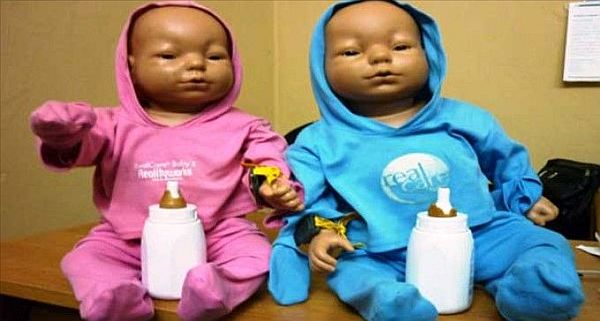Puerto Vallarta, Mexico - Students at the Regional Preparatory School of Puerto Vallarta are participating in an extracurricular program that aims to raise awareness among students about early motherhood. Called "Virtual Mom," the program involves teaching young girls about the physical and psychological process involved as well as the expenses that come with having, and raising, a baby.
The student volunteers who participate in the program must care for a specially designed doll for four months. The virtual baby simulates many of the actions of a real baby - he cries when he is hungry, colicky or sleepy, when he needs his diaper changed, or when he just wants to be held. The young women wear a sensor on their wrists that records the care given to the virtual baby by his "mom." The 'babies' can not be left at home, so the young 'mothers' must take time from their class schedules and recreational activities to care for their dolls.
According to the Regional Preparatory School Principal, Armando Soltero Macias, the Virtual Mom program originates from the detection of a lack of commitment, interference and responsibility of families when it comes to teen pregnancy.
"We were concerned about the number of student pregnancies; we regularly saw between seven and 10 cases a year, but since we have been offering the program, there has been only one."
This program is divided into four stages: physically simulating pregnancy, living with a doll that records the attentions given by the 'mother', attending a live birth, and participation in various courses on sexual responsibility.
The Virtual Mom Process
The dynamic is that the students who voluntarily enroll in the program undergo various activities and situations experienced during pregnancy, and understand the duties and responsibilities of motherhood after the baby is born.
In the first stage, the girls must wear an apron-shaped device that weighs from nine to 13 kilos, for five days, which simulates the physical effects of pregnancy, such as increased pressure on the bladder and difficulty performing everyday actions, like sitting and walking.
Subsequently, the virtually pregnant participants attend a real live birth at the Puerto Vallarta Regional Hospital which "gives a second impression of what the childbearing process and the difficulties of labor entail."
During the third phase, the student must care for the virtual baby 24 hours a day for four months. In some cases, the girls participate in the program alone, but in others, the parenting experiences and responsibilities are shared with the girls' partners.
Translated and edited by Marķa Francesca for BanderasNews.com.


